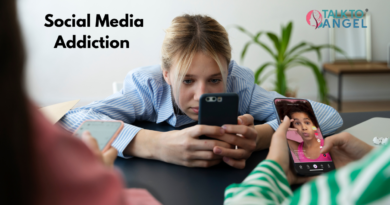How to Identify and Treat Shopping Addiction
A common recreational activity that is both necessary and pleasurable is shopping. However, for some, the excitement of buying turns into an uncontrollable urge, leading to financial stress, emotional disturbance, and strained relationships. This condition, commonly referred to as shopping addiction or compulsive buying disorder, is a behavioral addiction where the act of shopping becomes a way to cope with stress, anxiety, or other emotions.
In this blog, we’ll explore the signs of shopping addiction, its consequences, and how expert therapists at ThePsychowellness can help individuals regain control of their lives.
What is Shopping Addiction?
Shopping addiction is characterized by an irresistible urge to purchase items, often without need or financial capability. It’s not just about spending money it’s about the emotional highs and temporary relief it brings. Over time, these behaviors can lead to significant financial and emotional distress.
Signs of Shopping Addiction
Recognizing the symptoms of shopping addiction is crucial to addressing it. Some common signs include:
- Uncontrolled Spending: Frequently exceeding budgets or spending money meant for essentials.
- Emotional Relief: Shopping to escape sadness, loneliness, or stress.
- Hiding Purchases: Feeling ashamed of shopping habits and hiding items or receipts from others.
- Mounting Debt: Accumulating credit card debt or taking loans to sustain shopping habits.
- Negative Impact: Experiencing problems in personal relationships, work, or overall well-being due to shopping behaviors.
- Guilt and Regret: Feeling regret or guilt after shopping but being unable to stop.
Impact of Shopping Addiction
While shopping addiction may seem harmless initially, its long-term effects can be severe:
- Financial Problems: Over time, compulsive shopping can drain savings, increase debt, and lead to financial instability.
- Relationship Strain: Concealing purchases or frequent arguments over money can damage relationships.
- Mental Health Issues: The guilt, stress, and regret from shopping addiction often lead to depression, anxiety, or low self-esteem.
- Loss of Productivity: Time spent shopping or obsessing over purchases can interfere with work or other responsibilities.
Is There an Assessment for Shopping Addiction?
Yes, shopping addiction can be identified through specialized assessments and psychological evaluations. Therapists often use questionnaires and diagnostic tools to evaluate:
- The frequency and motivation behind shopping behaviors.
- Emotional triggers leading to compulsive buying.
- The impact of shopping on daily life, finances, and relationships.
At ThePsychowellness, experts provide comprehensive assessments to identify the severity of the problem and recommend personalized treatment plans.
Therapies for Shopping Addiction
Overcoming shopping addiction requires professional guidance. At ThePsychowellness, therapists utilize evidence-based approaches, including:
- Cognitive behavioral therapy, also known as CBT, assists people in understanding and changing the thinking patterns that underlie compulsive shopping.
- Emotional Regulation Training: Teaches clients healthier ways to manage emotions without resorting to shopping.
- Budgeting Skills and Financial Therapy: Assists clients in developing practical skills to regain financial control.
- Mindfulness-Based Techniques: Encourages awareness of emotional triggers and promotes impulse control.
- Support Groups: Provides a space for clients to share experiences and gain encouragement from others facing similar struggles.
Experts at ThePsychowellness
ThePsychowellness is home to a team of dedicated professionals specializing in behavioral addictions, including shopping addiction. Here’s a look at the experts ready to help:
- Dr. R. K. Suri: A renowned clinical psychologist with decades of experience, Dr. Suri uses a neuropsychological approach to address behavioral addictions, ensuring a deep and effective treatment process.
- Mr. Utkarsh Yadav: A counseling psychologist skilled in helping clients manage stress and develop healthier coping mechanisms, making him a strong ally in overcoming shopping addiction.
- Ms. Gurleen Kaur: With her patient and empathetic approach, Ms. Kaur helps clients uncover the emotional triggers behind their compulsive behaviors and regain control.
- Ms. Mansi: A family dynamics specialist child psychologist, Ms. Mansi provides valuable insights into how shopping addiction impacts familial relationships and how to rebuild trust.
- Ms. Dhristi Gakhar: Specializing in psychometric assessments, Ms. Gakhar ensures that clients receive accurate diagnoses and tailored treatment plans.
- Ms. Sangeeta Pal: A clinical psychologist with expertise in stress management, Ms. Pal helps clients address underlying anxiety or depression contributing to compulsive shopping.
- Ms. Riya Rathee: With a focus on mindfulness and emotional wellness, Ms. Rathee empowers clients to make lasting lifestyle changes.
- Ms. Sakshi Dhankhar: Skilled in cognitive therapies, Ms. Dhankhar works with clients to reshape negative thought patterns and build healthier habits.
- Ms. Tanu Sangwan: An expert in emotional regulation, Ms. Sangwan guides clients toward sustainable recovery by addressing core emotional issues.
- Ms. Srishti Jain: Known for her focus on personal growth and resilience, Ms. Jain supports clients in overcoming compulsive behaviors and finding healthier outlets for their emotions.
How ThePsychowellness and TalktoAngel Can Help
Whether you prefer in-person sessions or the convenience of online therapy, both ThePsychowellness and TalktoAngel provide effective solutions for shopping addiction. Their services include:
- Thorough Assessments: Identifying the severity of shopping addiction and its root causes.
- Personalized Therapy: Crafting customized treatment plans for lasting recovery.
- Flexible Options: Offering therapy both online counseling and offline counselling to suit individual needs.
Conclusion
Acknowledging shopping addiction is the first step toward recovery. Do not be afraid to seek professional assistance if you or a loved one is experiencing compulsive shopping. The team at ThePsychowellness is equipped to guide you toward a healthier, more balanced life.
References
- American Psychological Association. (2023). Understanding Compulsive Buying Disorder.
- World Health Organization. (2022). Behavioral Addictions: Scope and Treatments.
- Psychowellness Center. (2024). Therapeutic Services for Behavioral Addictions.
- TalktoAngel. (2024). Online Therapy for Behavioral Issues.




